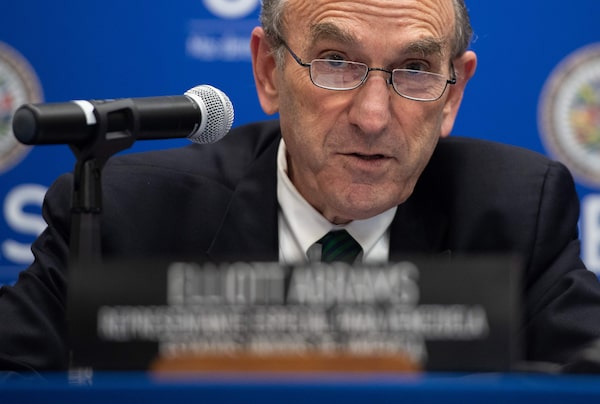
Elliott Abrams, the U.S. Special Representative for Venezuela, discusses the situation during a news conference at the headquarters of the Organization of American States in Washington on July 12, 2019.SAUL LOEB/AFP/Getty Images
The Trump administration’s point man on Venezuela says he is skeptical about Canada’s belief that Cuba could play a role in stabilizing the Venezuelan crisis, warning that top Cuban officials won’t abandon Nicolas Maduro.
U.S. Special Representative for Venezuela Elliott Abrams told The Globe and Mail on Thursday that, while he would like to see Cuba cease its support for the Maduro regime, it is unlikely to do so, given the country’s reliance on Venezuelan oil and foreign aid. Although Russia and China – long-time supporters of the Maduro regime – are starting to distance themselves from the Venezuelan dictator, Mr. Abrams said Cuba is desperately hanging on.
“It seems to us the Cubans are just going to hold on tight and try to prolong the life of the Maduro regime,” Mr. Abrams said. “I think they are dead-enders.”
In recent months, Prime Minister Justin Trudeau and Foreign Affairs Minister Chrystia Freeland have said Cuba could play a role in stabilizing Venezuela, particularly by working with the Lima Group, a regional bloc of countries trying to find a peaceful resolution to the crisis. However, Canada’s interest in involving Cuba has put it at odds with the United States, which has a historically frosty relationship with the island state that has worsened under U.S. President Donald Trump.
“Canada is a sovereign country and you have a relationship with Cuba that we don’t, so we certainly have no criticism to offer,” Mr. Abrams said in an interview. “We wish you luck, but we’re pessimistic.”
Mr. Abrams’ comments come two months after U.S. Vice-President Mike Pence said Canada and the United States must work together to “expose the malign influence of Cuba within Venezuela.” He made the comments at a news conference alongside Mr. Trudeau in Ottawa at the end of May, where the Prime Minister acknowledged the U.S. position but noted that Canada has a “very different view."

Canada's interest in involving Cuba in international efforts to ease tensions between the government of Venezuelan President Nicolas Maduro. seen in Caracas on July 28, 2019, has put it at odds with the United States, whose own relations with Havana have chilled under President Donald Trump.FEDERICO PARRA/AFP/Getty Images
Mr. Abrams, who was in Ottawa on Thursday to meet with Global Affairs Canada officials, said he is encouraged by Russia’s efforts to reach out to Venezuelan opposition leader Juan Guaido, who swore himself in as interim leader in January in a direct challenge to Mr. Maduro. The United States, Canada and dozens of other countries have publicly backed Mr. Guaido and called for Mr. Maduro to step down. However, the Maduro regime retains control of state functions and the country’s military.
“I think it’s [Russia] hedging their bets. And that suggests to everybody, starting with the Maduro regime, ‘well maybe the Russians think we’re not going to make it.’ So it’s politically and psychologically, very useful for the [Venezuelan] opposition that the Russians obviously think they need to have a contact," Mr. Abrams said.
Mr. Abrams said Russia and China have told the Americans they gave Mr. Maduro economic policy advice, but the Venezuelan leader did not take it.
Venezuela’s economy has collapsed under the Maduro government, with inflation topping 1,000,000 per cent in the past year. Facing widespread food and medicine shortages, more than four million people have fled the country since 2015, according to the UN Refugee Agency.
Mr. Maduro, whose regime has been accused of committing crimes against humanity, has blamed Washington and other Western countries, including Canada, for sabotaging Venezuela’s economy through sanctions. Mr. Abrams said the Trump administration would ease its sanctions on Venezuela and support reconstruction efforts right away if Mr. Maduro stepped down.
Mr. Abrams said that while “all options are on the table” to oust Mr. Maduro, use of force is a “last resort.” Mr. Trump has repeatedly threatened military intervention in Venezuela as other allies, including Canada, have opposed the idea.
Mr. Abrams previously served as a senior adviser to former president George W. Bush and worked as an assistant secretary of state during the Reagan administration. In 1991, he was convicted on two misdemeanor counts of withholding information from Congress about secret efforts to aid Nicaraguan rebels; George H.W. Bush pardoned him the next year.
He said his conviction is occasionally an issue for Cuba or the Maduro regime, but he never hears about it from “Latin American democrats" in the context of his work on Venezuela.
With reports from Reuters